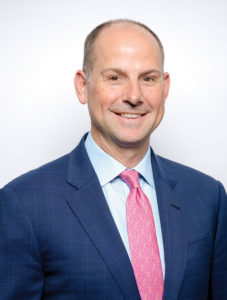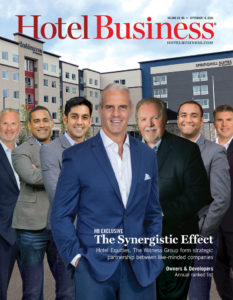 Michael Brown joined the company that would become Wyndham Destinations in 2017. He led the company during its spin-off from Wyndham Worldwide in 2018. Hotel Business caught up with the president/CEO on how the company and entire vacation ownership industry is handling COVID-19.
Michael Brown joined the company that would become Wyndham Destinations in 2017. He led the company during its spin-off from Wyndham Worldwide in 2018. Hotel Business caught up with the president/CEO on how the company and entire vacation ownership industry is handling COVID-19.
How has Wyndham Destinations fared during the COVID-19 pandemic? The underlying demand for leisure travel is strong. For us, the second quarter highlighted the strength and resiliency of our business model, and although the majority of our resorts were closed for much of the quarter, we were free cashflow- and EBITDA-positive.
While no one saw this year’s pandemic coming, we were able to quickly reduce our costs to the point where we can continue to operate the business at a cash-neutral rate for as long as we need to. We have a very strong cash position and we are able host our owners at our open resorts and sell vacation ownership to new customers.
How has it affected the entire vacation ownership industry? The industry is well positioned for the post-COVID world. Leisure travelers will be the first to return, and we are 100% focused on that market. Across the industry it is clear that there is pent-up demand; it is simply a matter of individual travelers making the best decision for themselves as to when they feel comfortable to travel.
What has become even more apparent to us and the branded timeshare companies—such as Wyndham Destinations, Marriott Vacations Worldwide and Hilton Grand Vacations—is that our core offering is more relevant than ever. People love the space and amenities they get with the comfort and confidence they get from being affiliated with a trusted brand.
How did you use the initial pause in leisure travel? We responded rapidly to prioritize the safety of our associates, customers and the communities where we operate. We closed our resorts and offices before the stay-at-home orders because we knew it was the right thing.
We developed a new cleaning and operating protocol in partnership with Ecolab called “Vacation Ready” and trained our people thoroughly on how to use it, and prepared our owners for what their experience would be like when they returned.
I took the position that the shutdown was a time to accelerate innovation—not to slow down. People often use the business analogy of how hard it is to change the tires on the car when you’re going 70 miles per hour, but all of a sudden, the car was in the garage and we had time to do the projects we wanted to do. For example, we were already working to make it easier and faster for guests to check in from their cars or elsewhere on the property. That particular project was perfect for the situation we were in, and we were able to accelerate that transition just in time for the restart to provide a more distanced, comfortable way for guests.
Tell me about Panorama, your new business line to manage the company’s exchange, membership and travel technology brands. RCI was the original vacation sharing service and now we’re evolving our offering to provide our customers with the opportunity to travel with RCI all year long, not just when they’re exchanging their timeshare ownership.
In addition, Panorama helps to reposition our exchange and travel services businesses into a more holistic travel company to help us expand outside the exchange business, leveraging our strategic acquisition of Alliance Reservations Network last year.
In its first significant market expansion, Panorama is launching Panorama Travel Solutions, to drive focused growth outside its core market. The group will offer customized global discount travel membership clubs and travel tech solutions to affinity partners including large employers, banks, retailers, trade associations and others in the U.S., Mexico, Asia and Europe.
In July, you announced you were committed to a review of resort names to ensure inclusion. Why did you make that decision? The ongoing social inequities and racial injustices, particularly against Black Americans, have left us all visibly shaken and angry. As a company, we are determining how we will be active and engaged, and we are working on steps we will take to be a change agent and to advance equality within our communities and throughout Wyndham Destinations.
It is our responsibility—individually and as one company—to have constructive dialogues, actions and movements to make this world more just. While there is not a single solution or action for our company, we will take some important first steps in our ongoing journey to help create change.
One step we are taking is to ensure our club owners, members, guests and associates always feel welcome. This includes assessing the language we use, both internally and customer-facing, to implement changes we recognize are necessary. As a result of this review, we are engaging our managed resort partners and their HOA boards in conversations to change the names of select resorts within our Wyndham Vacation Clubs portfolio.
What are your plans for Wyndham Destinations for the near future? We’re investing in growth areas for the company that are going to pay off for us in the long run. We’ll be opening the first timeshare resort in downtown Atlanta in 2022. We’ve also just opened an expansion of one of our Orlando resorts, and we’re nearing completion of our newest WorldMark by Wyndham resort in Moab, UT, which sits just outside the entrance to Arches National Park.
We’re also reminding the traveling public of why timeshare is a great way to travel. It really is a different experience today than people might have grown up with. Today’s owners with Wyndham Vacation Clubs have access to a network of 230 resorts around the world where they can make a lifetime of memories vacationing where they want, when they want, and in the type of accommodation they want. HB

